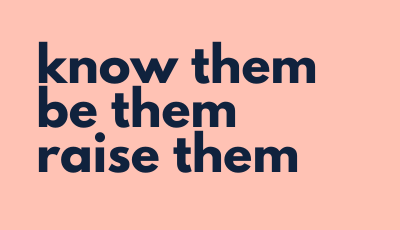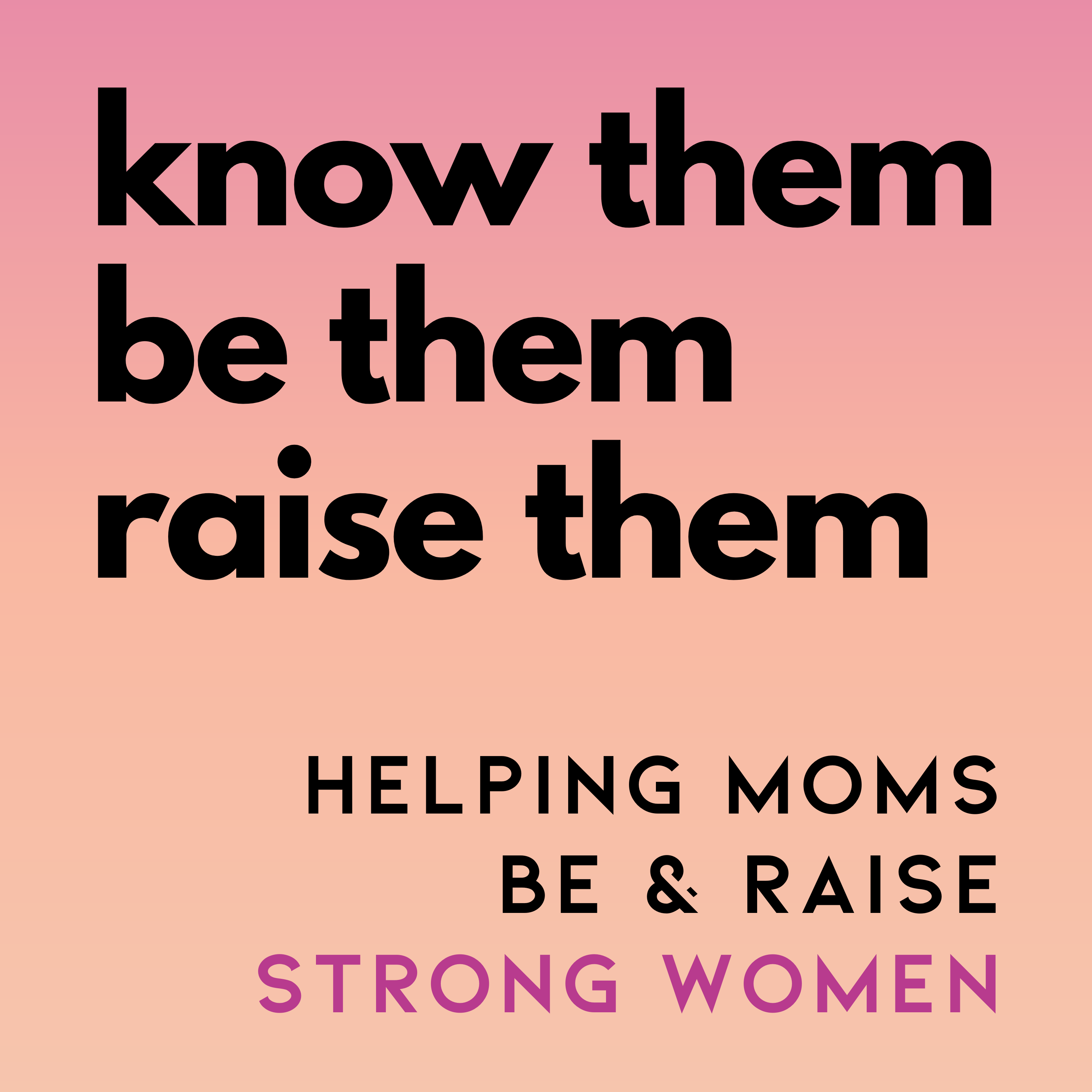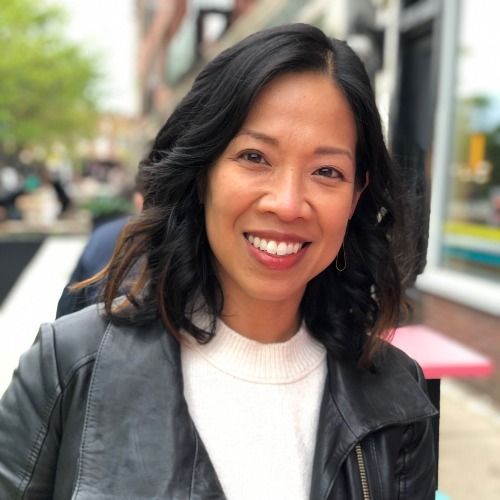Understanding Body Positivity & Fat Phobia // with Emily Lauren Dick
What does representation have to do with body image? What's body positivity, and what's body neutrality? Are you fat-phobic? Do your words and use of the word "fat" inadvertently feed into fat culture?
In this week’s episode, body positivity expert Emily Lauren Dick delves into all of these questions and more.
Emily explains:
- The origin of body image issues
- The difference between body positivity and body neutrality
- What parents can do to help their daughters love their bodies
- Fat phobia and fat talk, and how to avoid feeding into thin culture
For more info and to follow Emily Lauren Dick:
- www.happydaughter.com
- Instagram: @realhappydaughter
- Find Emily’s Book, Body Positive: A Guide to Loving Your Body on www.happydaughter.com , Amazon, Barnes & Noble, and other booksellers.
Other references in this episode:
- Ep. 22 with Lacey C. Clark! on Self-Love and Second-Guessing Society’s Definition of Success
- Ep. 19 with Neysa Page-Lieberman - Building Monuments to Resemble and Represent Us
Know Them, Be Them, Raise Them
Subscribe here: Apple, Spotify, Google. New episodes drop every Tuesday (and sometimes in between).
For more doses of information and inspiration:
- follow @knowberaisethem on Instagram
- Like the podcast page on Facebook
- sign up for our monthly newsletter
- visit www.knowberaisethem.com
Transcript
[00:00:27] If you like what you hear, be sure to follow or subscribe, tell a friend and follow @knowberaisethem on Instagram or Facebook.
[:[00:00:50] Her book, body positive, a guide to loving your body is the number one resource for young adult women who desire to redefine and understand true beauty. Emily believes that educating young people about body image, teaching resiliency and normalizing real bodies is critical in combating negative thinking and improving self-esteem.
[:[00:01:27] So, as you can probably tell from prior episodes, I'm keenly aware of the important role that body image plays in our lives, as well as our daughters' lives. And while I have a sense for what body positivity is, I wanted a deeper dive on the topic. Our conversation took off from there. Take a listen.
[:[00:02:03] Emily Lauren Dick: Well, um, it's funny. It took me until, uh, I was in university actually studying women's studies and gender and all that fun stuff. And I realized that there was sort of names and theories to the feelings I had had my entire life about my body image. And I was like, why has no one talked about this before, you know, all I had learned about growing up was, you know, how to lose weight, things like that, but no one ever talked about the struggle that we have with our body image issues and that, you know, It's normal to have them, first of all.
[:[00:03:09] And it kind of inspired me to make a book with lots of images and also give different perspectives from other people. Because, you know, my experience is going to be a little bit different than someone else's. And I think it's really important that we sort of frame all of these things and really, you know, it's, it's an introduction to body image and body positivity.
[:[00:04:15] Emily Lauren Dick: That's a great analogy. I love that.
[:[00:04:29] Emily Lauren Dick: Definitely. So body positivity really is this idea that all bodies are good bodies. It's, it's as simple as Um, you know, I think it has to do with the fact that we are all worthy of love, respect, but also that all bodies are, are beautiful.
[:[00:05:05] Emily Lauren Dick: So body neutrality is sort of a newer take on, you know, kind of stems a little bit out of the body positive movement. It's an in-between place for people that, you know, understand and want to recognize that their bodies don't define their worth, but without the pressure of having to love the way that their body looks because they're affected by society and all the things that they've gone through, they, they don't feel that the word body positive can explain sort of how they feel about their bodies, right? But I think at the end of the day, we all kind of got a strive towards body positivity. Um, But it's really a personal preference in, in which you choose, but it is knowing that all bodies are good bodies, you know?
[:[00:06:09] Emily Lauren Dick: Exactly, gives us all a little bit of space to explore that side of things.
[:[00:06:27] Emily Lauren Dick: So really, I think representation is key to all of this. Um, because naturally we're going to compare ourselves to what we see in the media, right? So the more representation that we see, the easier it's going to be to accept ourselves, because we're going to see qualities that we recognize in ourselves.
[:[00:07:09] And I think that really gives us a lot of power, but obviously that is something that is starting to change, but it's, it's a process because, the way that media and advertising is set up to, you know, make us feel insecure so that we buy their products. Um, but the thing is like it's extremely profitable to be using body positive advertising, you know, techniques. So why, why not go that route? If people are craving to see real bodies and, and people that look like them in the media?
[:[00:08:03] They they weren't
[:[00:08:28] Emily Lauren Dick: exactly. Well, you know why, we want to change things for future generations, right. That's what has led us down this path. And, uh, that's where we need to head, you know, we can't just focus on building resiliency in girls to handle this issue. We need to actually change the fact that there is an issue as well.
[:[00:09:00] Emily Lauren Dick: Exactly.
[:[00:09:12] Emily Lauren Dick: Absolutely. There are so many different things, but I think one of the biggest things is to stop focusing on appearance in itself. Um, so obviously I believe that that we need to see representation and that all bodies should be seen as beautiful, but also we have to separate the conversation away from appearance because talking to your child about their non-physical features,
[:[00:09:36] recognizing that things like their kindness, their intelligence, is what's more important is going to build self-esteem just in itself and, you know, It separates this idea that women and girls get their value from being beautiful.
[:[00:10:23] Um, because then they'll start thinking those thoughts about themselves that they'll see if you say, you know, you need to lose weight, they're going to think that about themselves. And we really need to push away from that type of thinking. Um, the other thing too is, some women, some parents, their body image issues really affect them living their daily lives.
[:[00:11:01] Carmelita (Cat) Tiu, Host: Yes. Role modeling, Um,
[:[00:11:04] Carmelita (Cat) Tiu, Host: important. Yeah, yeah. It's funny over time and I'm sure many women can relate to this, but I feel like between my friends or family members, I can see differences in how we approach life based upon how our mothers tackled it. Like we've inherited issues
[:[00:11:25] Carmelita (Cat) Tiu, Host: yeah. And, and reminding ourselves, if there are things we want to pass along to our kids, or not, that we have to step into those, like you said, fake it till you make it. Even if it doesn't resonate, like
[:[00:11:38] Carmelita (Cat) Tiu, Host: stop the cycle. Yeah. I have a friend who has struggled with body image and she remembers her mom always struggling with hers. So even if there wasn't a dialogue necessarily between her mom and her, it was something that informed her understanding of her body and her relationship to her body.
[:[00:12:04] Emily Lauren Dick: That wasn't good enough, right? Yeah. We have to be kind to ourselves, but to others as well. And that will make such a difference on how our children feel about their own bodies and, um, another thing too, I'm going off of sort of that dieting idea, like with us, you know, having moms that grew up going on weight Watchers and different types of diets and stuff like that.
[:[00:12:53] So really teaching kids to eat intuitively, which is just listening to their hunger cues, and having bits of everything really. It's just finding that balance and not saying, oh, that's bad. You know, all foods have nutrition, just some have different types of nutritional value.
[:[00:13:40] Carmelita (Cat) Tiu, Host: A question that came up as you were just talking was, you know, this tie between health and fitness, right? How can we promote healthy habits? Um, exercise, healthy eating, this idea of wellness, which has so just blown up.
[:[00:14:10] What are your thoughts on, on that line?
[:[00:14:51] It's good to move our bodies, but everyone is different. There are some people that can't move their bodies in ways that another person can. So really it's that subjective: what makes you feel good?
[:[00:15:03] Emily Lauren Dick: Same thing with our mind, what are we putting in, in our mind? What are the thoughts that we're consuming?
[:[00:15:32] And sometimes you feel like a salad and that's okay.
[:[00:15:59] Emily Lauren Dick: That's actually one of the principles of intuitive eating, right? It's finding joy in eating and food. And you know, sometimes it's about the community aspect and sometimes it's about just having alone time, whatever it is to you you'd know. Um, but it absolutely, it's not just fuel it's experience. It's joy. It's pleasure. It's all of those things.
[:[00:16:29] Emily Lauren Dick: absolutely.
[:[00:16:36] I think
[:[00:17:03] So it doesn't necessarily mean you have to be like, "I hate fat people," but it's just, if the word fat even makes you cringe, a bad word. Um, then that is fatphobia, you know, and it takes time to really dismantle, your thoughts about that. Even for me, it was like, Oh, I never thought about it that way.
[:[00:17:42] Carmelita (Cat) Tiu, Host: I never really thought about until relatively recently, but how the word fat is being used, it can really kind of inform and reflect upon you and, and maybe your kids, what their thought process is around this word. Because in and of itself it can be neutral, right? If you, I...
[:[00:18:10] Carmelita (Cat) Tiu, Host: Right. Kind of like the term gay, when being hurled as an insult, can tell like, that need that kind of behavior. That kind of talk be, you know, shut down or, shut down as... that makes it sound like no
[:[00:19:05] Fat's a description. there's nothing wrong with being fat. And, you know, the problem is that we, we think that there's something wrong with being fat as a society. Um, but also it's really that, we think of being fat as a problem to be fixed. So we need to, to teach people the correct words to use when they are feeling maybe insecure about their bodies, when they're experiencing body dissatisfaction. You know, sometimes it's just a matter of saying, like, I feel really bloated today or I'm having a bad body image day. So replacing the sentence from saying, oh, I feel fat to really what's going on in your body that's making you feel not good. Um, and then it separates fatness from a negative feeling or experience. So we really need to teach people, girls, especially the language, able to express themselves and express their body image concerns.
[:[00:20:38] Emily Lauren Dick: You know, often, kids will be teased because of fatness and sometimes, especially with kids that are actually fat, um, I've often heard, well, what do I do when my kid comes home and someone's called them fat, and really it's saying, first of all, there's nothing wrong with being fat.
[:[00:21:19] Um, So really fat is not a feeling is my, my number one, one and being fat is, is just an adjective. Right? So even if someone calls you fat, so what like accepting, accepting the fact that, um, that, that comment is not a problem.
[:[00:21:48] Emily Lauren Dick: Or even saying, I think you're using that as a word to try and insult me, but, uh, there's nothing wrong with being fat, you know, giving them a little explanation depending on the age. Right.
[:[00:22:14] Emily Lauren Dick: So there's a couple of things to unpack here. So one of them being, one thing we have to recognize is that a lot of the studies that prove there's a link to being fat or what they call obese, um, is that a lot of these studies are funded by diet companies. They want the research to say this. Second thing is, there is always going to be correlation, but can they prove causation?
[:[00:22:54] Carmelita (Cat) Tiu, Host: Hmm.
[:[00:23:15] So, a great resource actually for this conversation is on Instagram, @ thefatdoctorUK or fat doctor UK. Um, she's a doctor who specializes in dismantling a lot of these beliefs that, if you're fat you're not healthy.
[:[00:23:44] So there are plenty of people that have no choice over, you know, illness, struggling with cancer. They're not healthy people, there, there are things that people struggle with. But does that mean that they should be treated in a way that, you know, we're disgusted by them? The way that fat people are thought of, as if it's something that can easily be fixed.
[:[00:24:28] We all sort of have this plateau on how much weight we can lose and how much weight we can gain. I would say that, you know, people who often say, well, I'm concerned about your health because you're gaining weight, things like that. Well, are you really, are you thinking about appearance only? Because you can't see health, you really can't, there are a bunch of medical tests to do to determine if someone's healthy or not. And at the end of the day, does it really matter to you?
[:[00:25:05] Carmelita (Cat) Tiu, Host: Yeah, I like to wrap up episodes with an affirmation or maybe a favorite quote of yours. Do you happen to have one that you might want to share?
[:[00:25:48] Carmelita (Cat) Tiu, Host: There was a lot of ground covered in this conversation with so many insights. Here are my top takeaways.
[:[00:26:13] Number two. Body positivity is the idea that all bodies are good bodies and are beautiful, worthy of love and respect. Body neutrality is a term for an in-between place for people that want to recognize that their bodies don't define their worth, but don't feel the term body positive explains how they feel about their bodies right now.
[:[00:26:52] Number four. To encourage our girls to love their bodies the way downplay the focus on appearance and recognize their non-physical features like their kindness work ethic and talents. Also take note of your behaviors as a parent model your behavior after what you hope to see in your child.
[:[00:27:33] What kind of movement? What thoughts? What food, what amount of rest works for you physically, emotionally and mentally.
[:[00:28:22] Number seven. You cannot see health. Being quote, unquote fat does not mean someone is unhealthy. Choose to question the attitudes that are so pervasive and damaging, and approach others with more compassion and kindness.
[:[00:28:52] To learn more about Emily, you can visit happydaughter.com. Or follow her on Instagram @realhappydaughter.
[:[00:29:11] A heartfelt thanks for listening. Your time is precious and I'm always honored to share some of that with you.
[:[00:29:23] If you're on Facebook or Instagram, follow @knowberaisethem for inspirational quotes, tips and reminders to help you show up for yourself and your daughter, the way you want to and feel free to DM me with episode, topic, ideas, comments, or feedback. I love hearing from y'all. Again, I'm grateful for you.
[:

